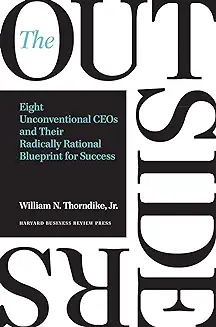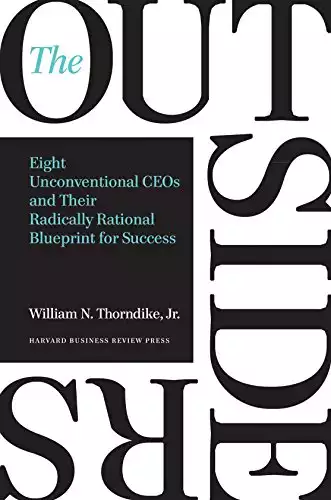Overview : The Outsiders
- Book Title: The Outsiders
- Author: William Thorndike
- Publication Date: October 2012
- price: $18.99
- Pages: 240
Overview of the Book
Thomas J. Stanley was a marketing professor and researcher who dedicated his career to studying America's wealthy. William D. Danko is a professor emeritus of marketing at the School of Business, State University of New York at Albany. Together, their research has significantly influenced our understanding of wealth in America. In conclusion, this article has provided an overview of the topic at hand.
Introduction
In the realm of personal finance literature, few books have made as significant an impact as "The Millionaire Next Door" by Thomas J. Stanley and William D. Danko. First published in 1996, this groundbreaking work continues to challenge our perceptions of wealth and success in America. Through extensive research and analysis, the authors present a compelling portrait of the average millionaire, one that defies popular stereotypes and offers valuable insights for those aspiring to build long-term wealth.
Book Summary
"The Millionaire Next Door" is based on over two decades of research into the habits and characteristics of America's millionaires. The authors' findings reveal that the typical millionaire is not the flashy, high-spending individual often portrayed in media, but rather a frugal, disciplined saver who lives well below their means. Key points from the book include:
- Most millionaires are self-made, often running their own businesses in unglamorous industries
- They prioritize financial independence over displaying high social status
- Millionaires typically live in middle-class neighborhoods and drive modest cars
- They are meticulous budgeters and investors, focusing on long-term wealth accumulation
- Many millionaires prioritize education for their children but do not provide excessive financial support
The book challenges readers to reassess their own financial habits and provides a roadmap for building sustainable wealth through disciplined saving and investing.
Analysis of Themes
Frugality and Wealth Accumulation
A central theme of "The Millionaire Next Door" is the strong correlation between frugality and wealth accumulation. The authors argue that living below one's means is a crucial factor in building long-term wealth. This concept aligns with modern personal finance principles, such as the FIRE (Financial Independence, Retire Early) movement, which emphasizes aggressive saving and investing.
Entrepreneurship and Wealth Creation
The book highlights the role of entrepreneurship in wealth creation. Many of the millionaires studied owned their own businesses, often in industries that might be considered unglamorous. This insight remains relevant in today's economy, where small businesses and startups continue to be significant drivers of wealth creation.
Financial Education and Generational Wealth
Stanley and Danko emphasize the importance of financial education, both for oneself and for future generations. This theme resonates with current discussions about financial literacy and its role in addressing wealth inequality.
Writing Style
The authors present their findings in a clear, accessible manner, blending statistical analysis with anecdotal evidence. While the writing can be dry at times, the insights are compelling enough to keep readers engaged. The use of case studies and real-life examples helps illustrate key concepts and makes the material more relatable.
Strengths and Weaknesses
Strengths:
- Groundbreaking research that challenges common misconceptions about wealth
- Practical advice for building long-term wealth
- Emphasis on financial independence over conspicuous consumption
Weaknesses:
- Some of the data may be outdated, given the book's original publication date
- The focus on high-income professions may not be as relevant to all readers
- Limited discussion of modern investing tools and strategies, such as index funds or cryptocurrencies
Comparison to Other Works
"The Millionaire Next Door" can be compared to other influential personal finance books such as "Rich Dad Poor Dad" by Robert Kiyosaki and "Your Money or Your Life" by Vicki Robin and Joe Dominguez. While Kiyosaki's book focuses more on mindset and financial education, and Robin and Dominguez emphasize the relationship between money and personal values, Stanley and Danko's work stands out for its data-driven approach and focus on the habits of actual millionaires. In the context of more recent financial literature, "The Millionaire Next Door" aligns well with the principles outlined in books like "The Simple Path to Wealth" by JL Collins, which advocates for a straightforward, low-cost investing strategy.
Highlights from The Outsiders
- The Outsiders: A coming-of-age novel by S.E. Hinton, exploring class conflict.
- Greasers vs. Socs: The rivalry between working-class "Greasers" and upper-class "Socs."
- Character development: Focuses on Ponyboy Curtis and his journey of self-discovery.
- Themes of loyalty: Strong bonds among the Greasers despite social challenges.
- Friendship and identity: The characters struggle with identity, belonging, and finding their place in society.
- Violence and empathy: Highlights the destructive nature of violence and the importance of understanding others.
Conclusion
"The Millionaire Next Door" remains a valuable resource for anyone interested in personal finance and wealth-building strategies. While some aspects of the book may feel dated, its core message about the importance of living below one's means and investing for the long term is as relevant today as it was when first published. For investors and aspiring millionaires, this book offers a refreshing perspective on wealth that counters the get-rich-quick mentality often prevalent in financial media. By focusing on sustainable habits and long-term thinking, readers can gain valuable insights into building lasting financial security.
"Wealth is more often the result of a lifestyle of hard work, perseverance, planning, and, most of all, self-discipline." - Thomas J. Stanley and William D. Danko





